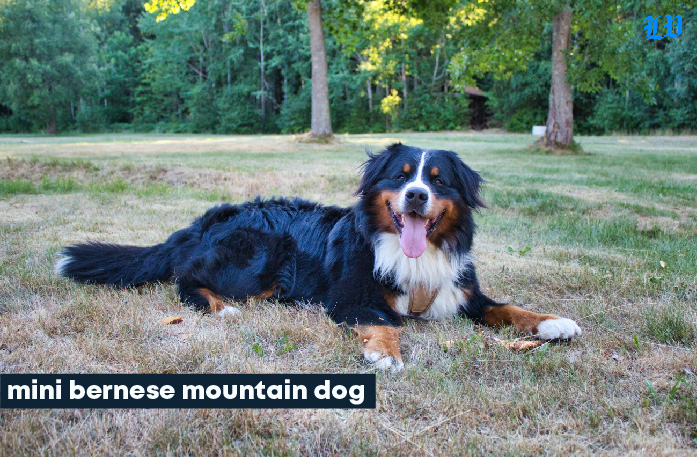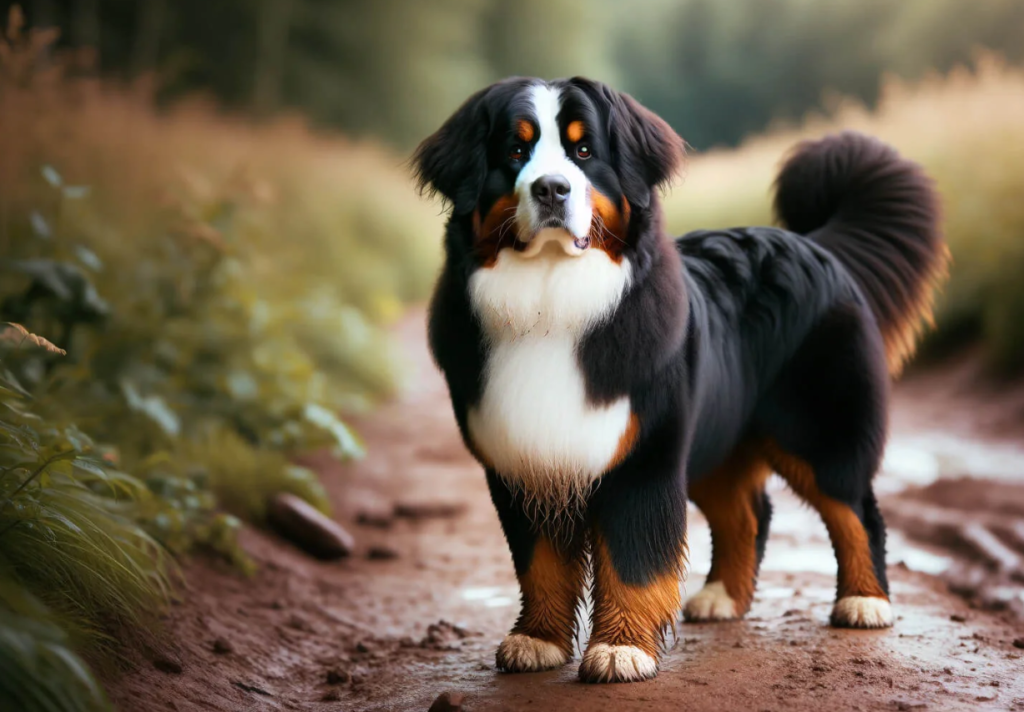LifeStyle
Charming and Compact: The Mini Bernese Mountain Dog
Published
10 months agoon
By
Steve
The Mini Bernese Mountain Dog, often referred to as a “pocket-sized” version of the beloved Bernese Mountain Dog, is gaining popularity among dog enthusiasts. This smaller breed retains the charming characteristics of its larger counterpart while offering a more manageable size for those living in apartments or with limited space. In this article, we’ll explore everything you need to know about the Mini Bernese Mountain Dog, from its origins to its temperament and care requirements.
The Origins of the Mini Bernese Mountain Dog
The Mini Bernese Mountain Dog is a relatively new breed, developed to capture the essence of the Bernese Mountain Dog in a more compact form. This breed is typically created by crossing the Bernese Mountain Dog with smaller breeds such as the Cavalier King Charles Spaniel or the Miniature Poodle. The result is a dog that maintains the distinctive tricolor coat and gentle disposition of the Bernese Mountain Dog but in a smaller, more convenient package.

Breeders began developing the Mini Bernese Mountain Dog to meet the growing demand for smaller dogs that still possessed the desirable traits of the Bernese Mountain Dog. These dogs are not only easier to manage in terms of space but also tend to have a longer lifespan, which is an added benefit for prospective dog owners.
Appearance and Size: What to Expect
One of the main attractions of the Mini Bernese Mountain Dog is its adorable appearance. These dogs typically weigh between 25 to 50 pounds, making them significantly smaller than the standard Bernese Mountain Dog, which can weigh up to 115 pounds. They usually stand between 16 to 19 inches tall at the shoulder, which makes them an ideal size for those who want the look of a Bernese without the bulk.
The Mini Bernese Mountain Dog retains the classic tricolor coat of black, white, and rust that is characteristic of the larger breed. Their coats are thick and slightly wavy, providing them with an elegant and endearing look. Despite their smaller size, these dogs still possess the sturdy build and strong bones of the Bernese Mountain Dog, giving them a robust and hardy appearance.
Temperament: The Gentle Giant in a Smaller Package
The Mini Bernese Mountain Dog is known for its friendly and affectionate nature. These dogs are incredibly loyal and form strong bonds with their families. They are gentle with children and get along well with other pets, making them an excellent choice for families of all sizes.
Despite their smaller size, Mini Bernese Mountain Dogs retain the calm and easygoing temperament of their larger counterparts. They are not overly energetic, making them suitable for both active families and those who prefer a more relaxed lifestyle. However, they do enjoy outdoor activities and will thrive in environments where they can participate in walks, hikes, and playtime.

These dogs are also known for their intelligence and willingness to please, which makes them relatively easy to train. They respond well to positive reinforcement techniques and enjoy learning new tricks and commands. Due to their social nature, Mini Bernese Mountain Dogs do best when they are included in family activities and can become anxious if left alone for extended periods.
Health Considerations: What Owners Should Know
As with any breed, potential owners should be aware of the health considerations associated with the Mini Bernese Mountain Dog. While these dogs tend to be healthier than their larger counterparts, thanks to their hybrid vigor, they can still be prone to certain health issues.
One of the most common concerns is hip dysplasia, a condition that affects the hip joints and can lead to arthritis and mobility issues. Regular veterinary check-ups and maintaining a healthy weight can help mitigate the risk of this condition. Additionally, due to their long, thick coats, Mini Bernese Mountain Dogs are prone to heat sensitivity, so it’s important to keep them cool in warmer weather.
Another potential health issue is progressive retinal atrophy (PRA), an inherited condition that can lead to blindness. Responsible breeders screen for PRA and other genetic conditions to ensure the healthiest possible puppies.
It’s also worth noting that Mini Bernese Mountain Dogs require regular grooming to keep their coats in top condition. Their thick fur can become matted if not brushed regularly, and they may need professional grooming several times a year to maintain their appearance.
Living with a Mini Bernese Mountain Dog: Ideal Home Environment
The Mini Bernese Mountain Dog is an adaptable breed that can thrive in various living environments, from city apartments to rural homes. However, prospective owners should consider their lifestyle and living situation before bringing one of these dogs home.
Due to their size, Mini Bernese Mountain Dogs are more suited to smaller living spaces than their larger counterparts. However, they still require regular exercise and mental stimulation to keep them happy and healthy. Daily walks, playtime in the yard, and interactive toys can help meet their physical and mental needs.
These dogs also benefit from having a fenced yard where they can explore and play safely. While they are not known for being escape artists, it’s important to provide a secure environment, especially if they are left outside unsupervised.
Because Mini Bernese Mountain Dogs are social animals, they do best in homes where they can spend plenty of time with their families. They may not be the best choice for individuals who work long hours or travel frequently, as they can develop separation anxiety if left alone for too long.
Nutrition and Diet: Feeding Your Mini Bernese Mountain Dog
A balanced diet is crucial for the health and well-being of the Mini Bernese Mountain Dog. These dogs require a diet that provides the necessary nutrients to support their growth, energy levels, and overall health.
High-quality commercial dog food that is formulated for small to medium-sized breeds is usually suitable for Mini Bernese Mountain Dogs. It’s important to choose a diet that is appropriate for their age, size, and activity level. Puppies will need food that supports their growth and development, while adult dogs require a diet that maintains their energy levels and weight.
Owners should also be mindful of portion control, as Mini Bernese Mountain Dogs can be prone to obesity if overfed. Feeding them the recommended amount based on their weight and activity level will help keep them in optimal condition.
Treats can be used for training and rewarding good behavior, but they should be given in moderation to avoid excessive weight gain. Additionally, providing fresh water at all times is essential to keep your dog hydrated and healthy.
The Joy of Owning a Mini Bernese Mountain Dog
Owning a Mini Bernese Mountain Dog can be a deeply rewarding experience. These dogs bring the best of both worlds: the loyal and gentle nature of the Bernese Mountain Dog in a more manageable size. Their affectionate personality, combined with their striking appearance, makes them a popular choice for families, singles, and seniors alike.
In summary, the Mini Bernese Mountain Dog offers all the charm and beauty of the standard Bernese Mountain Dog, but in a smaller, more adaptable package. Whether you live in a city apartment or a country home, this breed can make a wonderful companion, bringing love, loyalty, and joy to your life. By understanding their needs and providing them with proper care, you can ensure that your Mini Bernese Mountain Dog thrives as a beloved member of your family.

Who Is Lynn Hamilton? Celebrating the Life and Legacy of the American Actress

Who is Mickey Gooch Jr? The Dynamic Journey of a Film Producer and Actor

Who Is Pierre Bouvier? All About the Canadian Singer and Musician Behind Simple Plan

Who Is Pearl Minnie Anderson? Rising Star in Maya Rudolph’s Legacy

Who is Minnie Pearl? The American Comedian Who Brought Country Humor to the Spotlight

Who Is Kavan Smith? The Canadian Actor Known for His Versatile Roles

Who is Olivia Rose Cameron: The Creative Artist & Daughter of Kirk Cameron

Who Is Markella Kavenagh? All About the Australian Actress and Rising Star

Who is Tracey Hinds? Exploring the Life of Macy Gray’s Ex-Husband and Mortgage Broker

Who is Eric Weinberger? A Visionary Television Producer Shaping Sports Media

Who Is Dan Jeannotte? All About the Canadian Actor’s Career and Roles

Who Is Paul Fenech? Inside the World of the Australian Filmmaker and Actor

Who Is Merri Kelly Hannity? All About Sean Hannity’s Daughter

Who Is Diana Espinoza Aguilar? The Story of Rafael Caro Quintero’s Wife

Who is Charlee Fraser? The Rise of the Australian Model and Actress Making Global Waves

Who Is James Lesure? All About the American Film and Television Actor

Who is Eric Weinberger? A Visionary Television Producer Shaping Sports Media

Who Is Toru Ohtani? All About Shohei Ohtani’s Father & Baseball Coach

Who is Torrei Hart? The Multitalented Actress and Comedian Making Waves

Who Is Avantika Vandanapu? Rising American Actress & Singer

Who Is Lynn Hamilton? Celebrating the Life and Legacy of the American Actress

Who is Mickey Gooch Jr? The Dynamic Journey of a Film Producer and Actor

Who Is Pierre Bouvier? All About the Canadian Singer and Musician Behind Simple Plan

Who Is Pearl Minnie Anderson? Rising Star in Maya Rudolph’s Legacy

Who is Minnie Pearl? The American Comedian Who Brought Country Humor to the Spotlight

Who Is Kavan Smith? The Canadian Actor Known for His Versatile Roles

Who is Olivia Rose Cameron: The Creative Artist & Daughter of Kirk Cameron

Who Is Markella Kavenagh? All About the Australian Actress and Rising Star

Who is Tracey Hinds? Exploring the Life of Macy Gray’s Ex-Husband and Mortgage Broker

Who is Eric Weinberger? A Visionary Television Producer Shaping Sports Media
Trending
-

 Celebrity11 months ago
Celebrity11 months agoNecati Arabacı: Net Worth, Biography, and More
-

 Celebrity12 months ago
Celebrity12 months agoDiscovering Lily Phillips: An Insight into Her Life and Career
-

 Celebrity12 months ago
Celebrity12 months agoParker Schnabel’s Girlfriend: A Comprehensive Look at His Relationships Over the Years
-

 Celebrity11 months ago
Celebrity11 months agoEnrica Cenzatti: Life of Andrea Bocelli’s Ex-Wife
